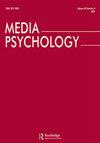对社交媒体影响者关于新冠肺炎错误信息的回应:预先注册的多人暴露实验
IF 3.4
2区 心理学
Q1 COMMUNICATION
引用次数: 16
摘要
在当前的“信息大流行”中,围绕着与COVID-19相关的虚假声明和阴谋论的传播,社交媒体影响者,Instagram等平台上的热门人物,是错误信息的潜在来源。作为看似普通和值得信赖的个人,他们可以作为意见领袖发挥作用,影响者可能会影响对病毒的看法和为尽量减少其威胁而制定的政策。在这个预先注册的在线实验中(N = 148),我们调查了影响者与副社会关系等因素,这些因素可能会增加对影响者言论的易感性。其次,我们研究了媒体素养和特定问题知识是否作为减少错误信息影响的保护因素。尽管参与者基本上没有受到错误信息的影响,但对于那些认为网红可信度高、信任网红建议和态度同质的受访者来说,它增加了对官方消息来源的不信任。与此同时,无论是否接触到错误信息,参与者对特定问题的了解与对COVID-19误解的信念较弱相关。本文章由计算机程序翻译,如有差异,请以英文原文为准。
Responses to Social Media Influencers’ Misinformation about COVID-19: A Pre-Registered Multiple-Exposure Experiment
ABSTRACT In the current “infodemic,” surrounding the spread of false claims as well as conspiracy theories related to COVID-19, social media influencers, popular figures on platforms like Instagram, are a potential source of misinformation. As seemingly ordinary and trustworthy individuals, who can function as opinion leaders, influencers may impact perceptions of the virus and policies in place to minimize its threat. In this pre-registered online experiment (N = 148), we investigated factors such as parasocial relationships with the influencer, which potentially increase susceptibility to influencers’ claims. Second, we examined if media literacy and issue-specific knowledge act as protective factors diminishing the impact of misinformation. Although participants remained largely unaffected by the misinformation, it increased mistrust in official sources for respondents with high perceived influencer credibility, trust in influencer’s advice, and attitude homophily. Meanwhile, participants’ issue-specific knowledge was associated with weaker beliefs in misconceptions regarding COVID-19, irrespective of exposure to misinformation.
求助全文
通过发布文献求助,成功后即可免费获取论文全文。
去求助
来源期刊

Media Psychology
Multiple-
CiteScore
8.60
自引率
7.10%
发文量
30
期刊介绍:
Media Psychology is an interdisciplinary journal devoted to publishing theoretically-oriented empirical research that is at the intersection of psychology and media communication. These topics include media uses, processes, and effects. Such research is already well represented in mainstream journals in psychology and communication, but its publication is dispersed across many sources. Therefore, scholars working on common issues and problems in various disciplines often cannot fully utilize the contributions of kindred spirits in cognate disciplines.
 求助内容:
求助内容: 应助结果提醒方式:
应助结果提醒方式:


